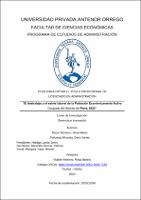| dc.contributor.advisor | Vidalón Moreno, Rosa Beatriz | |
| dc.contributor.author | Dezar Montero, Jhoel Alexis | |
| dc.contributor.author | Policarpo Miranda, Dario Xavier | |
| dc.creator | Dezar Montero, Jhoel Alexis | |
| dc.date.accessioned | 2023-11-09T22:19:32Z | |
| dc.date.available | 2023-11-09T22:19:32Z | |
| dc.date.issued | 2023 | |
| dc.identifier.uri | https://hdl.handle.net/20.500.12759/11374 | |
| dc.description.abstract | El presente trabajo de investigación muestra como realidad problemática, la
situación del teletrabajo y el estrés laboral de la Población Económicamente Activa
Ocupada de la ciudad de Piura, cuya modalidad se ha implementado de manera
inmediata a raíz de la emergencia sanitaria desatada a nivel mundial por la
pandemia Covid-19. Asimismo, el objetivo de la investigación fue determinar la
relación entre el teletrabajo y el estrés laboral de la Población Económicamente
Activa Ocupada del distrito de Piura, 2022. Se utilizó un diseño descriptivo –
correlacional y para ello se trabajó con una muestra de 383 personas
pertenecientes a la Población Económicamente Activa Ocupada del distrito de Piura
en el año 2022, se aplicó un muestreo no probabilístico y el instrumento utilizado
es el cuestionario, el cual constó de 17 ítems de preguntas respecto al teletrabajo
y el segundo cuestionario con una escala de 1 a 5 puntos referido al estrés laboral
el cual consta de 17 ítems. Ambos instrumentos fueron validados por el juicio de
tres expertos de la Universidad Privada Antenor Orrego y su índices de Alfa de
Cronbach fueron de 0.827 y 0.883 respectivamente para cada variable, mostrando
así su confiabilidad. Los resultados indican que existe una relación inversa perfecta
entre ambas variables, con un coeficiente de correlación de Spearman de -0.952.
Concluyendo que, las empresas han incorporado estos mecanismos de teletrabajo
para que sus colaboradores sigan trabajando, sin embargo, por ser una nueva
modalidad les ha costado adaptarse a las plataformas digitales y, sobre todo,
porque presentan problemas de conectividad, generando en sus colaboradores un
nivel de alto de estrés laboral. | es_PE |
| dc.description.abstract | The present research work shows as a problematic reality, the relationship of
teleworking in the work stress of the Economically Active Employed Population of
the city of Piura, whose modality has been implemented immediately because of the
health emergency unleashed worldwide by the Covid-19 pandemic. Likewise, the
objective of the research was to determine the relationship between teleworking and
work stress of the Economically Active Employed Population of the district of Piura,
2022. A descriptive-correlational design was used and for this, a sample of 383
people belonging to To the Economically Active Employed Population of the district
of Piura in the year 2022, a non-probabilistic sampling was applied, and the
instrument used is the questionnaire, which consisted of 17 question items
regarding teleworking and the second questionnaire with a scale from 1 to 5 points
referred to work stress which consists of 17 items. Both instruments were validated
by the judgment of three experts from the Antenor Orrego Private University and
their Cronbach's Alpha indices were 0.827 and 0.883 respectively for each variable,
thus showing their reliability. The results indicate that there is a perfect inverse
relationship between both variables, with a Spearman correlation coefficient of -
0.952. Concluding that, companies have incorporated these teleworking
mechanisms so that their collaborators continue working, however, because it is a
new modality, it has been difficult for them to adapt to digital platforms and, above
all, because they present connectivity problems, generating in their collaborators a
high level of job stress. | en_US |
| dc.description.uri | Tesis | es_PE |
| dc.format | application/pdf | es_PE |
| dc.language.iso | spa | es_PE |
| dc.publisher | Universidad Privada Antenor Orrego | es_PE |
| dc.relation.ispartofseries | T_ADMIP_140 | |
| dc.rights | info:eu-repo/semantics/openAccess | es_PE |
| dc.rights.uri | https://creativecommons.org/licenses/by/4.0/ | es_PE |
| dc.source | Universidad Privada Antenor Orrego | es_PE |
| dc.source | Repositorio Institucional - UPAO | es_PE |
| dc.subject | Teletrabajo | es_PE |
| dc.subject | Estrés Laboral | es_PE |
| dc.title | El teletrabajo y el estrés laboral de la Población Económicamente Activa Ocupada del distrito de Piura, 2022 | es_PE |
| dc.type | info:eu-repo/semantics/bachelorThesis | es_PE |
| thesis.degree.level | Título Profesional | es_PE |
| thesis.degree.grantor | Universidad Privada Antenor Orrego. Facultad de Ciencias Económicas | es_PE |
| thesis.degree.name | Licenciado en Administración | es_PE |
| thesis.degree.discipline | Administración | es_PE |
| dc.subject.ocde | https://purl.org/pe-repo/ocde/ford#5.02.04 | es_PE |
| renati.advisor.orcid | https://orcid.org/0000-0002-4606-7185 | es_PE |
| renati.author.dni | 72727825 | |
| renati.author.dni | 74326581 | |
| renati.advisor.dni | 18122105 | |
| renati.type | https://purl.org/pe-repo/renati/type#tesis | es_PE |
| renati.level | https://purl.org/pe-repo/renati/level#tituloProfesional | es_PE |
| renati.discipline | 413016 | es_PE |
| renati.juror | Hidalgo Lama, Jenry | |
| renati.juror | Barinotto Roncal, Patricia | |
| renati.juror | Márquez Yauri, Heyner | |
| dc.publisher.country | PE | es_PE |





